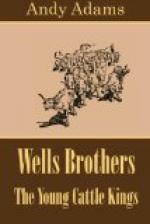“And how many men did it take?” insisted Dell.
“Only eleven with the herd. And they had such queer names for their places. Those in the lead were point men, those in the middle were swing men, and the one who brought up the rear was the drag man. Then there was the cook, who drove the wagon, and the wrangler, who took care of the horses—over one hundred and forty head. They call the band of saddle horses the remuda; one of the men told me it was Spanish for relay—a relay of horses.”
“I’m going the next time,” said Dell. “Mr. Quince said he would buy us a cow from the next herd that passed.”
“These were all big beeves to-day, going to some fort on the Yellowstone River. And they had such wide, sweeping horns! And the smartest cattle! An hour before noon one of the point men gave a shrill whistle, and the whole column of beeves turned aside and began feeding. The men called it ‘throwing the herd off the trail to graze.’ It was just like saying halt! to soldiers—like we saw at that reunion in Ohio.”
“And you weren’t afraid?” timidly queried the younger brother.
“No one else was afraid, and why should I be? I was on horseback. Stop asking foolish questions and go to sleep,” concluded Joel, with pitying finality, and turned to the wall.
“But suppose those big Texas beeves had stampeded, then what?” There was challenge in Dell’s voice, but the brother vouchsafed no answer. A seniority of years had given one a twelve hours’ insight over the other, in range cattle, and there was no common ground between sleepy bedfellows to justify further converse. “I piloted in the doctor, anyhow,” said Dell defensively. No reply rewarded his assertion.
Morning brought little or no change in the condition of the wounds. The doctor was anxious to return, but Priest urged otherwise. “Let’s call it Sunday,” said he, “and not work to-day. Besides, if I overtake the herd, I’ll have to make a hand. Wait until to-morrow, and we’ll bear each other company. If another herd shows up on the trail to-day, it may have a cow. We must make these boys comfortable.”
The doctor consented to stay over, and amused himself by quarreling with his patient. During the forenoon Priest and Joel rode out to the nearest high ground, from which a grove was seen on the upper Beaver. “That’s what we call Hackberry Grove,” said Joel, “and where we get our wood. The creek makes a big bend, and all the bottom land has grown up with timber, some as big as a man’s body. It doesn’t look very far away, but it takes all day to go and come, hauling wood. There’s big springs just above, and the water never fails. That’s what makes the trees so thrifty.”
“Too bad your father didn’t start a little ranch here,” said Priest, surveying the scene. “It’s a natural cattle range. There are the sand hills to the south; good winter shelter and a carpet of grass.”




